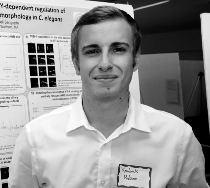Kendrick Rubino
 Sengupta Laboratory
Sengupta Laboratory
Department of Biology
Brandeis University
A role for the IFT-A complex in the TUBBY-dependent regulation of cilia membrane composition and cilia morphology in C. elegans
Poster Abstract
Primary cilia are cellular organelles that function as important signaling hubs for the cells to sense their external environment. Abnormal ciliary signaling in humans can cause disorders, termed ciliopathies. Proper ciliary signaling requires that many signaling molecules are trafficked to and within the cilia, but these trafficking mechanisms are not well characterized. The TUBBY family of proteins has been implicated in trafficking ciliary cargo into the cilia, but previous evidence suggests that these proteins function via different mechanisms in different cell types. Based on published work, I hypothesize that the C. elegans TUBBY family member, TUB-1, requires a motor protein adapter called the IFT-A complex to help TUB-1 shuttle ciliary cargo into the cilia. To determine if IFT-A plays a role in TUB-1 function I have shown that mutations in the IFT-A subunit daf-10 phenocopy tub-1 mutant phenotypes. This may suggest that TUB-1 and the DAF-10 subunit of the IFT-A complex function in the same genetic pathways. However, I have also determined that DAF-10 is not required for the correct localization of TUB-1 to the cilia and mutating the presumptive IFT-A binding sites within the TUB-1 protein can only rescue some of the tub-1 mutant phenotypes. Preliminarily, I have established that the human TULP1 construct that lacks a characterized IFT-A binding site shows a different localization pattern than TUB-1.
Personal Statement
My time in the lab this summer has been a great opportunity for me to be able to continue the research I began earlier this year. I was able to pursue the many questions I had in my research project and find conclusions. My time this summer also generated more questions for me to hopefully answer in the future. The Bauer Fellowship also gave me the opportunity to begin work on my senior thesis, which I will be completing over the upcoming school year. Also, this fellowship has given me the opportunity to work on projects that will soon be out for review and eventually published. Over this time in the fellowship, I became a much more confident scientist and I will look back on this fellowship as a time where I was able to gather my own data present it in front of a larger audience.